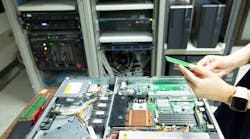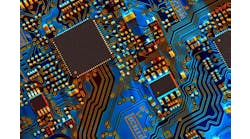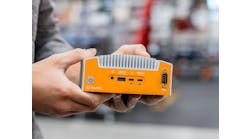Industrial computers have certainly evolved from the rack-mounted IBM 7532.
Its high-performance specs included an Intel 80286 CPU, along with 512 KB of RAM, a high-capacity 1.2-MB 3.5-inch floppy-disk drive and a battery-backed clock/calendar feature and a reset button for when it stalls or hangs.
An optional feature was a 20-MB hard disk drive, as well as a math co-processor, all in an industrial package that included a fan with a changeable filter.
It was designed to meet the requirements of industrial settings, such as temperature, vibration and power issues. The fan filter contained the particulates that may try to enter the enclosure that was housing the computer parts and devices.
In 1985, this was a new option available that allowed a PC to be on the factory floor and available to all operations of the process. Netware was the networking platform of choice at the time—remember ARCNet?—which required the IT department to get involved. So, taking the control to the process allowed the OT department to deal with implementations on their own terms.
Also read: Vintage industrial PCs stand the test of time
I do remember, since I was with Allen-Bradley at the time, that this specific computer was being touted as the next big thing to run beside the PLC on the same floor. It ran well most of the time, but there was a nagging feeling that the computer needed to be protected. But from what?
Putting a Dell I5 personal computer of today on the factory floor is asking for trouble. There is a big cost difference between a standard desktop PC and one designed for the industrial environment. I did in fact use Dell PCs in a warehouse environment where the dust was a problem. They ran for 10 years and were not in an enclosure. Just lucky, I guess.
Putting a commercial-grade PC into an enclosure can be of some benefit, however. I’ve discussed the use of purge systems for hazardous locations. Having a PC in that environment would not be a good thing without a proper enclosure.
In a high-pressure molding area where lots of liquids are used for cooling and lubrication, placing the HMI PC into a protected environment is crucial. Airborne contaminants can cause all kinds of issues, depending on what those contaminants are.
Another reason for isolating a PC would be for cooling issues. I have worked in an area creating code and HMI screens for an aluminum low-pressure die-casting farm where there were multiple casters that created a lot of heat and contaminates. This would be a good place to put the computer in a protected environment.
Also read: The extreme IPC
I have seen installations where there has been an actual air-conditioning unit installed in the side of the cabinet to keep the inside cooler than the ambient temperature.
I reached out to Ed Boutilier, the founder of Stealth Computers, who’s supplied the industry with individually configured industrial computers since the 1980s. I wanted to be sure that I had my bases covered.
In this day and age of high-powered PCs that can be fanless and have great cooling capabilities due to heat-sink design, what would be the advantage of the extra cost of placing that PC into an enclosure?
The early days of computers suffered from blue-screen-of-death (BSOD) operating-system failures, as well as application software irregularities. They needed to have the ability to be reset. By removing the opportunity to hard-reboot the computer, modern systems operate with a higher level of availability.
The other issue is security. USB drives can’t be plugged into the computer, which can be instantly recognized by the majority of computers running Windows.
Theft is no longer an option either. Some of the installations I have seen make my head shake; operators have actually installed software for gaming.
One of the advantages of an industrial computer is that multimedia devices rarely exist which arguably cause most of the disruptions in operations. Standard computers have so much of that built-in that it’s almost impossible to get hardware without it.
Regardless of the computer configuration, there are various reasons as why you would want to put it in a protective cabinet. Like a good insurance policy, it is always there to protect your assets.
Just keep the door closed.





